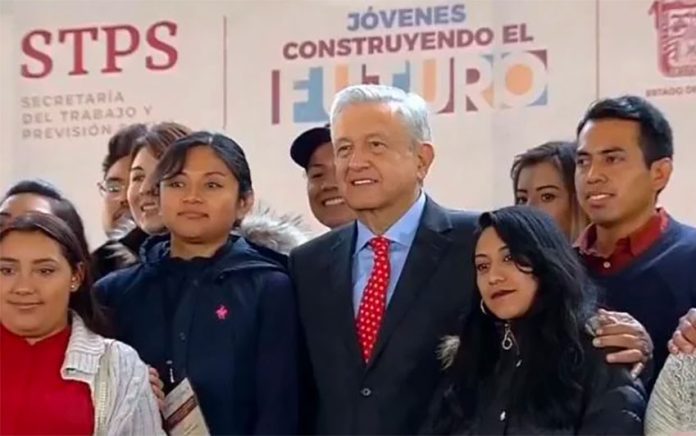The federal government’s youth employment scheme has been used as a vehicle for corruption in Nuevo León, according to a report by the newspaper Reforma.
The report said that the “Youth Building the Future” apprenticeship scheme, one of the government’s flagship social programs, has not just benefited young people in the northern border state who were out of a job and not studying.
Reforma, which conducted a five-month-long investigation into the operation of the scheme, said the program – which it described as a “corruptible tool without controls” – was used to divert large amounts of public money in the municipality of Linares and the metropolitan area of Monterrey.
The newspaper said it determined that Reyes Lucio Zurita, a former official in the Linares government, created a corruption scheme in that municipality and that Yahir Omar Guerrero Ríos, an aspiring federal deputy, led another one in Monterrey.
To establish what occurred, Reforma conducted 140 interviews with beneficiaries of the Youth Building the Future program, which pays people aged between 18 and 29 a monthly stipend, or scholarship, of 4,310 pesos (US $210) while they complete a one-year apprenticeship with an approved employer. The newspaper also obtained documents pertinent to the operation of the program in the state.
Reforma said that testimonies and documents revealed that Lucio, a former economic development official in the current Linares government led by National Action Party Mayor Fernando Adame, colluded with local business owners to build a scheme that was used to register about 100 young people in the apprenticeship scheme and divert their monthly payments.
Lucio made job offers, phony or otherwise, to young people in order to obtain their personal details. He then used those details to enroll them – without their consent – in the Youth Building the Future program. According to young people who spoke with Reforma, Lucio kept their bank cards corresponding to the accounts into which the federal government paid monthly scholarships to them.
An 18-year-old woman, a music student, told Reforma that Lucio offered her a job playing music in a market and at private parties for 1,000 pesos (US $49) per month. She said that she kept her bank card but Lucio obligated her via telephone calls and visits to her home to transfer 2,700 pesos per month to him.
“He has bags full of [bank] cards and I saw where he sent a person to withdraw money from all the cards,” the young woman said. “… All these other people didn’t work but I did work.”
In the Monterrey area, Guerrero, who is aiming to become a lawmaker with the ruling Morena party, created a scheme in which he attracted university students with an offer to pay them 1,600 pesos a month to attend self-improvement workshops offered by a business he owns.
To join the workshops – which ran in 2019 and 2020 – the students had to sign an agreement in which they committed to transfer 2,000 pesos of 3,600 pesos they would receive on a monthly basis via the youth employment scheme to Guerrero. (The stipend increased from 3,600 pesos to 4,310 pesos this year.)

Dyvanhi Patricia González García, a 21-year-old medicine student, told Reforma that she heard about the workshops in 2019. She said she was asked to provide her personal details when registering, and did, but ultimately decided to back out and not attend.
González said she was unaware at the time that there was a Youth Building the Future website where young people could be registered to participate. According to program records, González received two payments totaling 7,200 pesos but she said she didn’t see the money.
Reforma sought comment from Lucio and Guerrero but both refused to speak.
Highlighting the lack of oversight of the apprenticeship scheme in Nuevo León, the newspaper said there are 2,240 companies that supposedly provide employment for more than 5,600 young people in the state but the Labor Ministry only has 14 inspectors to ensure that the program is functioning correctly.
In a separate report published Thursday, Reforma said that signing up is simple and that the program is highly susceptible to corruption. There are also plenty of funds to target: by the end of this year, the federal government, which took office at the end of 2018, will have spent 70 billion pesos (US $3.4 billion) on it.
The program is designed for so-called ninis, young people who neither work nor study (ni trabaja, ni estudia), but in order for someone to register he or she only has to provide a “declaration of good faith” that he or she is neither employed nor studying.
Reforma journalists said there was no impediment to them signing up for the program, adding that supposed security features built into the online system can easily be bypassed.
The system should reject people who are registered with the Mexican Social Security Institute as a result of being employed or studying, but Reforma found that at least eight students in Nuevo León were able to enroll.
After the newspaper published its report on Wednesday, the Labor Ministry (STPS), which is responsible for the youth employment program, admitted that there have been irregularities in Nuevo León.
The ministry said that workplaces in Linares where irregularities were detected were withdrawn in August 2020. The same fate befell two workplaces in San Nicolás de los Garza, a municipality in the metropolitan area of Monterrey, in March last year, the STPS said.
The ministry said it is working with the federal Attorney General’s Office to conduct a probe into a municipal official (Lucio) who deceived young people and companies to enroll them in the scheme. The STPS said that he and any other people found guilty of wrongdoing in relation to the apprenticeship program will be sanctioned.
It said that the cases highlighted by Reforma are not representative of the scheme as a whole.
![]()
“These cases detected in March and August last year in two municipalities in the state of Nuevo León don’t tarnish the reach and achievements that the Youth Building the Future program has had. The vast majority of mentors and businesses that participate are committed to the training of hundreds of thousands of young people who work and learn at small businesses and large companies,” the ministry said.
“It’s not the first time that the Reforma newspaper has published biased and incomplete information with the desire to discredit a collective effort between the public sector and the private sector. Nor is it the first time that it uses the word ninis to describe young people seeking opportunities that were denied to them before. The families of these young people and the young people themselves would undoubtedly appreciate a different … [descriptive term] from the newspaper.”
The STPS “categorically” denied the characterization of the employment scheme as a “corruptible tool that allows public resources to be diverted.”
“ … All the work centers are verified by Labor Ministry personnel … to ensure that the spaces have the [appropriate] conditions to receive apprentices. Additionally all the work centers are visited in a random manner once the training starts to make certain it is taking place.”
It is not the first time that Youth Building the Future has faced accusations of corruption. Mexicans Against Corruption and Impunity, a non-government organization, published a report in August 2019 that spoke of the probable existence of “phantom” work centers and discrepancies between the number of persons enrolled in the employment scheme and the number who are actually undertaking training.
Earlier the same month, federal officials in Aguascalientes, Campeche, Chiapas, Guerrero, Nayarit, San Luis Potosí, Sonora, Tabasco and Yucatán said that some young people enrolled in the apprenticeship program were handing over part of their monthly payments to their employers in exchange for waiving their obligation to show up to work.
Source: Reforma (sp)
